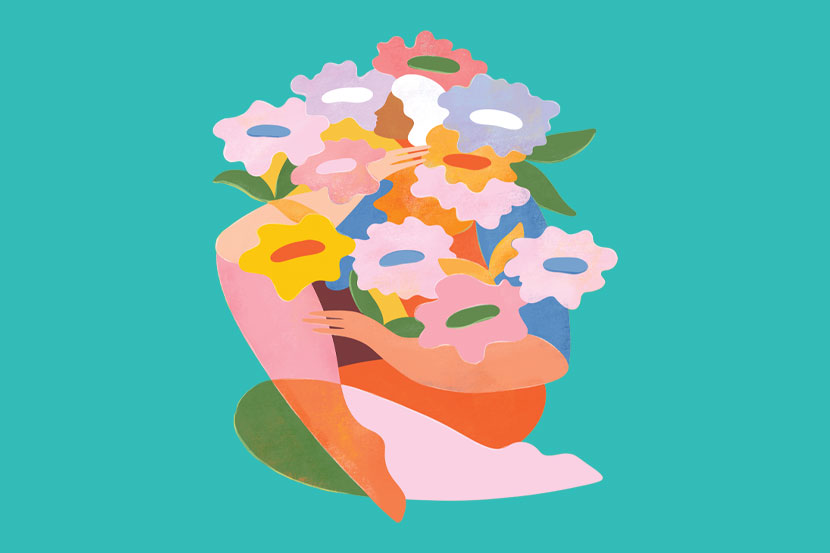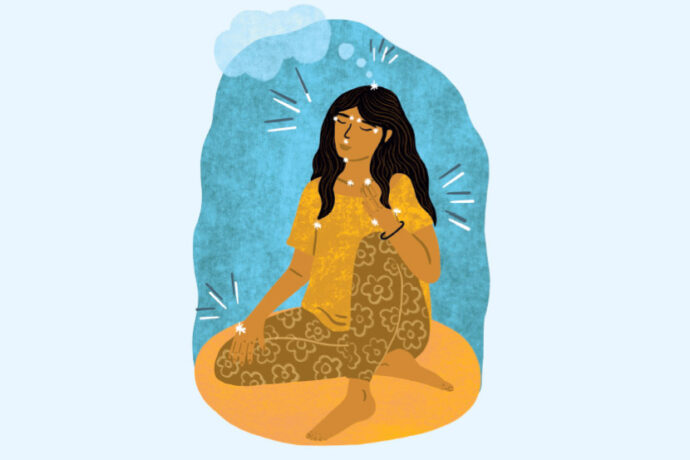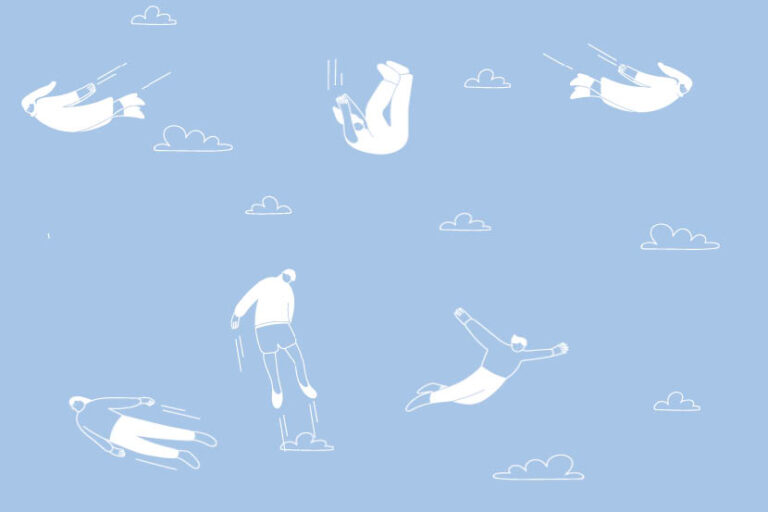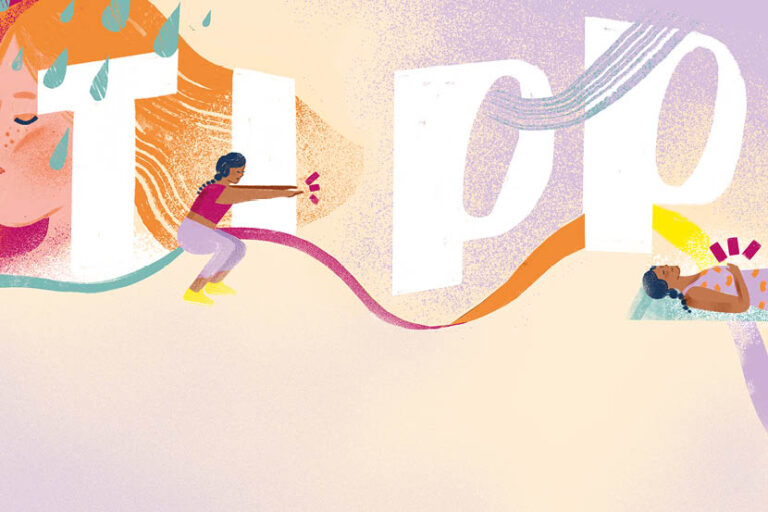
Have you ever compared yourself favourably to someone who’s going through a tough time? You’re not alone. We explore the psychology behind downward comparison, how it affects wellbeing, mindful techniques to help shift your mindset, and give you a free downloadable Gratitude Guide to help get you started.
‘I don’t know why I do it, it’s a bit like doomscrolling. But when I see people in the news who have messed up, or whose relationships are on the rocks, I just feel a little better about my own messy life,’ says Katya, 45.
Why we compare ourselves
That small boost of elation, that tiny buzz of self-righteousness – as short-lived as it might be, sometimes, it’s all you need for a brief moment’s respite from your own chaotic life. This is downward comparison in action – the act of comparing yourself (more favourably) with someone who’s faring worse than you. That might be a celebrity, or even a friend.
It’s enough to make you feel guilty, but if you were to admit it to yourself, might it also make you feel a little happy?
The influence of social media
According to research carried out by three social psychologists – EA Pomery, FX Gibbons, and ML Stock – published in 2012, downward social comparison can be defined as: ‘…an emotional coping technique that can help one feel better in the short term, although it is often not the best long-term strategy for dealing with a threat.’
The threat is whatever is going on in your own life that’s causing pain or feelings of low self-worth.
As the quote states, downward comparison is far from the ideal method for tackling life’s problems, but it’s a coping mechanism to which many turn as part of the human experience. There must be few people who could say they’d never had recourse to it for comfort, even if only for a fleeting moment. Most – like Katya – will have succumbed to it at some point. She says: ‘I remember specifically a friend coming to me for advice. She thought I had everything together and her life was falling apart. I really wasn’t doing that much better than her, but the fact she thought I was made me feel better about everything.’
According to research, this behaviour can start from age six or seven and is more predominant in boys than girls. Boys were more likely to compare themselves with others as a marker of their achievements. For example: “I’m better at math than Amir” or “I can run faster than George”. It probably won’t come as a surprise that teenagers fare worse as they grow older, thanks in part to the magnifying effects of comparison through social media. Negatively comparing yourself to a friend or classmate (upward comparison, as opposed to downward) is one thing, comparing yourself with a highly stylised, filtered image is unrealistic and damaging. And it’s not just image that gets measured – young adults often find themselves comparing lifestyle choices and achievements on top of that. Finding someone with fewer followers and a less-than-perfect life provides little respite to the spiral of upward, unfavourable comparison.
It’s easy to find fault with yourself, especially if others’ accomplishments shine an unwelcome spotlight on your own perceived failings. It’s even easier to enjoy a moment of smugness, drawing out a little joy from another’s struggles. How, then, is it possible to avoid the temptation of doing either? Neurolinguistic programming coach and founder of the Studio Think App, Katie Leask, has this suggestion: ‘By comparing yourself to others, you’re looking for reassurance, and that kind of extrinsic reassurance is only fleeting. To really boost your confidence, you need to find a sustainable source, and that comes from within’.
Using mindfulness to shift perspective
There are plenty of mindfulness practices that can provide this source of confidence-building. Two of Katie’s suggestions are affirmations and gratitude journalling (see below): ‘Affirmations, when used repeatedly, engage your feelings and have the ability to rewire your beliefs. Ideally, take a few minutes to do them while looking in the mirror in the morning or evening when you’re brushing your teeth. If this doesn’t feel comfortable, simply run them through in your head on repeat while you go about your day. Feeling and repetition are key to reprogramming your mind. Hearing and believing what you’re capable of doing again can help redirect your thoughts away from those negative paths and towards those that suit you.
‘Another good way is to journal on gratitude – your gratitude for who you are in every way, at this minute. It can feel hard at first, but spending time every day finding and writing things you’re grateful for about yourself – inside and out – can help to positively rewire your mindset. The more you find yourself grateful for who you are, the more you’ll raise your self-love, self-esteem, self-acceptance and, of course, self-confidence.’

How upward comparison can inspire growth
It’s also worth considering some positive effects of upward comparison. According to a 2010 study on math anxiety in middle-school students, carried out by Sahin Kesici and Ahmet Erdogan, professors at Necmettin Erbakan University in Turkey, comparing yourself with those doing better than you can be a motivating factor to make helpful changes in your life. Removing negativity from the equation acts as a far greater motivation to do better. And this motivation is where it all starts.
‘Affirmations, when used repeatedly, engage your feelings and have the ability to rewire your beliefs’ – Katie Leask
When you have a genuine desire to understand yourself more effectively (rather than feel better about yourself or put someone else down), then the data you take from a comparison with a successful person can be a tool.
In their 2018 paper, Upward and Downward Social Comparisons: A Brief Historical Overview, Joshua Guyer and Thomas Vaughan-Johnston say: ‘This type of comparison is often made in an effort geared towards self-improvement, in that identifying others who outperform us may provide valuable information that in turn can help improve our own performance. Upward comparisons can also serve a self-enhancement function through assimilation with a target. Identifying similarities (assimilation) between oneself and the target of an upward social comparison has been linked to feelings of positive affect’.
To use a more common term, it’s looking at a role model, someone you admire, whose qualities or achievements you’d like to emulate. In theory at least, that person is a force for good, and their achievements are genuine rather than contrived through social-media filters or exaggerated for the sake of gaining more followers. In practice, it’s a fine tightrope to tread. Aspirations are one thing, setting yourself up for failure is quite another. It’s unrealistic to assume you’ll never compare yourself to others.
Indeed, it’s an act that helps you better understand who you are and where you fit in the world. As Guyer and Vaughan-Johnston conclude: ‘Identifying perceived similarities and differences between the self and others is a ubiquitous social phenomenon that allows individuals to better understand not only themselves but also others, and thus more successfully navigate their social world’.
Finding balance in self-reflection
Wherever you feel you are on the social spectrum, there will always be those who seem to have it all and others who fall below your own or your culture’s standards of success. How you choose to look at either end of that spectrum goes a long way towards influencing how you feel about yourself. The wise move is to tread carefully, both when looking for role models with whom to identify and when thinking about or engaging with people who appear not to be doing quite as well.
At any one time it’s possible to occupy both positions, but that’s all part of the human experience.
♥ Ready to build self-confidence through mindfulness? Download your free Gratitude Guide today and start your journey towards greater self-awareness and inner peace. ♥
ILLUSTRATIONS: Maggie Stephenson


















